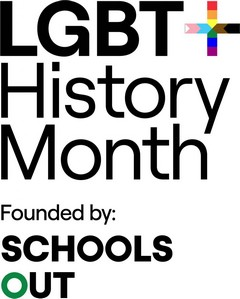
|
LGBT+ History Month is an annual month-long observance of lesbian, gay, bisexual and transgender history, and the history of the gay rights
and related civil rights movements. It was founded in the USA in 1994 by a high-school history teacher Rodney Wilson from Missouri.
In the UK, LGBT+ History Month provides role models, builds community, and represents a civil rights statement about the contributions of the LGBTQ+ community, and as in previous years it's linked to a school National Curriculum subject. In 2025 Schools OUT is celebrating its 50th year by presenting 20 years of UK LGBT+ History Month. The LGBT+ Education Charity's goal is to make our schools and educational institutions safe spaces for Lesbian, Gay, Bisexual and Trans (LGBT) communities including teachers, students, parents, staff and governors. UK LGBT+ History Month was created to:
| |
|
The UK LGBT+ history month takes place every February so that it coincides with the anniversary of the abolition of Section 28 in 2003.
Section 28 was part of the Local Government Act 1988, brought in by the backward and homophobic Conservative government of Margaret Thatcher. Their new law stated that a local authority "shall not intentionally promote homosexuality or publish material with the intention of promoting homosexuality" or "promote the teaching in any maintained school of the acceptability of homosexuality as a pretended family relationship". |

|
|
The resultant effect of this was teachers and other school staff became fearful of
doing what they knew and felt to be the right thing.
This fear was further exacerbated by some factions of society and the media through misrepresentation,
which in turn meant that same-gender relationships were simply not discussed or visible in our schools.
Of course lesbian, gay and bisexual young people have always existed in the world and, therefore, in our classrooms. However, because of this law, they did not see themselves reflected in the education they were receiving and did not have the language to describe their own experiences. The cruel legislation was singly responsible for the bullying of many young children in school, whether they were gay, or just thought to be gay. It claimed the lives of many young people, particularly young men, who committed suicide as a result of them realising they were gay and them being unable to face the prejudice of their every day lives. It gave bigots and thugs all the excuses they needed to verbally and physically attack LGBTQ+ people, in particular young people. It saw vulnerable teenagers being made homeless, by families who'd thrown them out of the family home. Section 28 was abolished by Tony Blair's Labour Government in 2003, and more than twenty years on from this, we find ourselves moving increasingly towards the right side of history. For many more schools than ever before, positive and inclusive education around lesbian, gay and bisexual lives and identities is just part and parcel of teaching all students about the world they actually live in. Furthermore, we’re learning to embrace lesbian, gay and bisexual young people as valued, included and visible, simply part of the rich diversity of any (school) community, with more freedom than ever to explore this element of who they are. | |
|
The UK 2025 LGBT+ History Month theme is: Activism and Social Change.
Each year is set a theme, whilst choosing five LGBT+ historical figures to highlight. A number of free resources are provided to a range of education settings, organisations, and businesses. In addition, across social media channels, they highlight the five LGBT+ historical figures and UK LGBT+ people past and present in line with their theme. |
 LGBT+ History Month 2025 badge designed by Emily, a 12-year-old pupil from St Anthony’s Girls’ Catholic Academy in Sunderland. |
The 2025 LGBT+ Historical Figures are:
Amongst the events in this year's LGBT+ History Month are:
The overall aim of LGBT+ History month is to promote equality and diversity for the benefit of the public. This is done by:
| ||
 The Modern Pride Flag. | LGBT History Month is marked every February by schools, colleges and various teaching organisations across the country, who seek to increase people's awareness of the LGBT+ community through education. The fact that so many young people nationwide take part shows just how vital it is. | |
|
Many different organisations are holding events to acknowledge LGBT+ Hostory Month and honour the history of the LGBT+
community, including educational talks, virtual art exhibitions, film screenings and readings in many venues throughout the UK.
You can find out more on the LGBT+ History Month website, where there's information and some downloadable presentations, webinars and videos exploring many aspects of UK and International LGBT+ history. | ||
